In the past, we have already introduced you to some of the most delicious Polish dishes and shown you that Poland tastes good. But as we didn’t just want to give you a theoretical introduction to all the delicious things you can eat in Poland, we went on a trip to the eastern voivodeships of Poland and present some really special, sustainable and surprising family businesses that are guaranteed to make your mouth water!
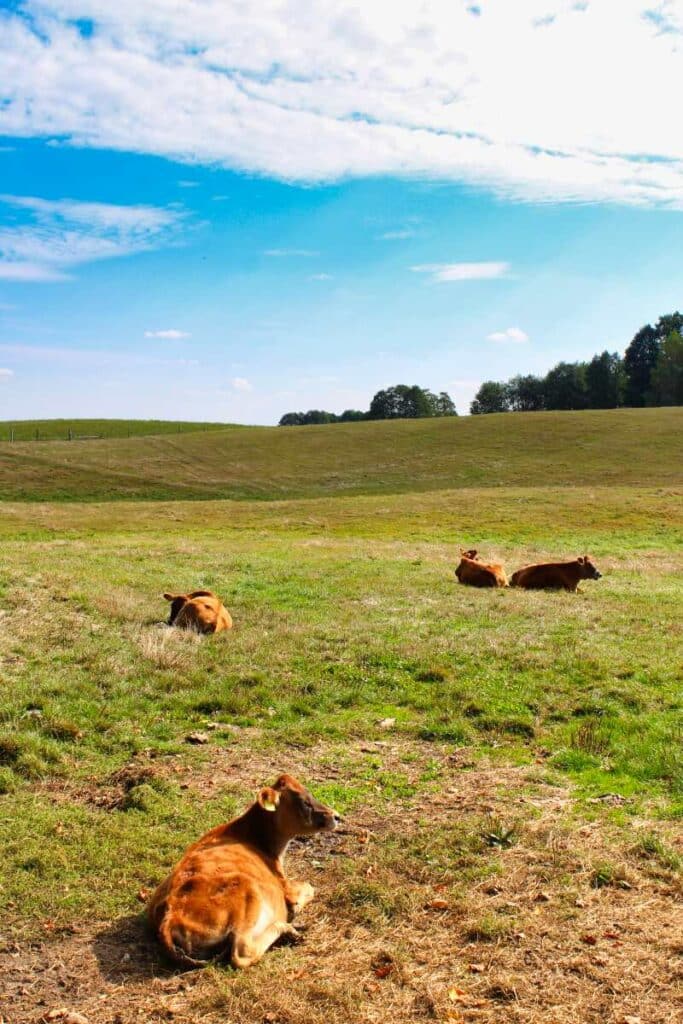
Ranczo Frontiera
When you think of delicious cheese, countries like France and Switzerland probably come to mind first. But we were able to see for ourselves in Masuria that this also applies to Poland to a large extent. Admittedly, you have to drive a long way to get to Ranczo Frontiera. Although the small farm is only around 15 km south of Reszel, the road is adventurous and you need a sturdy car. And then you arrive in an idyllic setting. A few cows graze on a pasture and your gaze wanders into the distance, there is nothing here but trees, pastures and lakes – pure idyll and typical Masuria!
We are greeted by a friendly man and his daughter. We learn that the family is actually from Poznan, but were fed up with life in the city and bought a farm with around 17 hectares of land around 20 years ago. The family soon began experimenting with cheese production and have since developed a cheese that is so delicious that you can hardly get enough of it. Ranczo Frontiera is not a mass farm, however, as the family only keeps four Jersey cows.
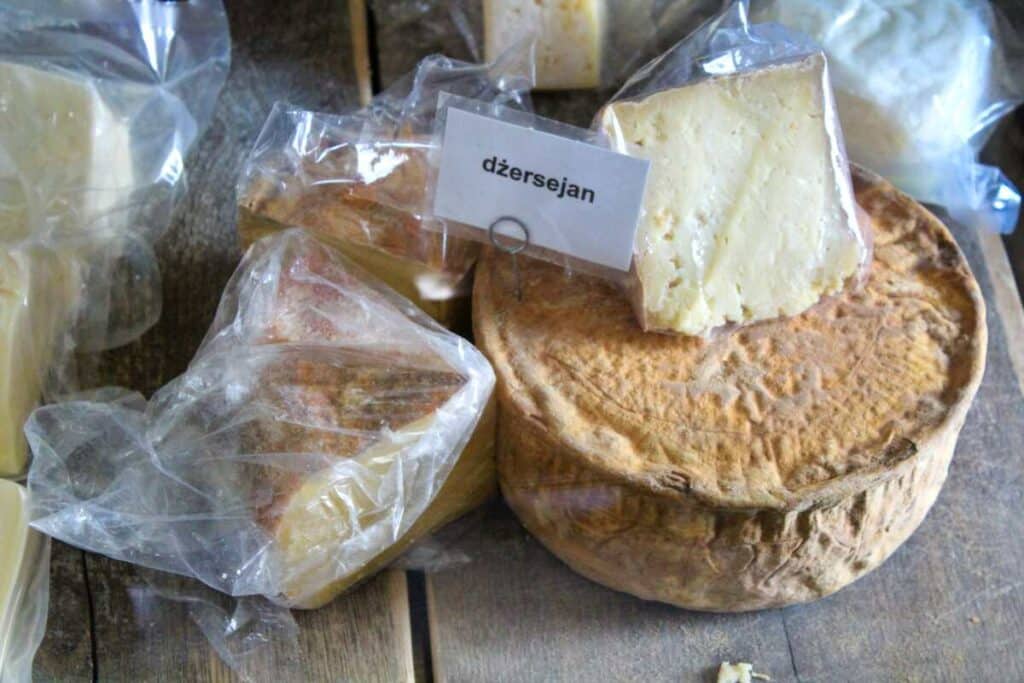
Anything else would spoil the quality, says the farmer, who is actually a pianist. Why are we telling you this? Quite simply because it affects the quality of the cheese, at least that’s what the farmer is sure of. He regularly plays to his cows. But perhaps the cheese here is so good because you can simply feel that the animals are respected here, that they have plenty of space and simply a relaxed life.
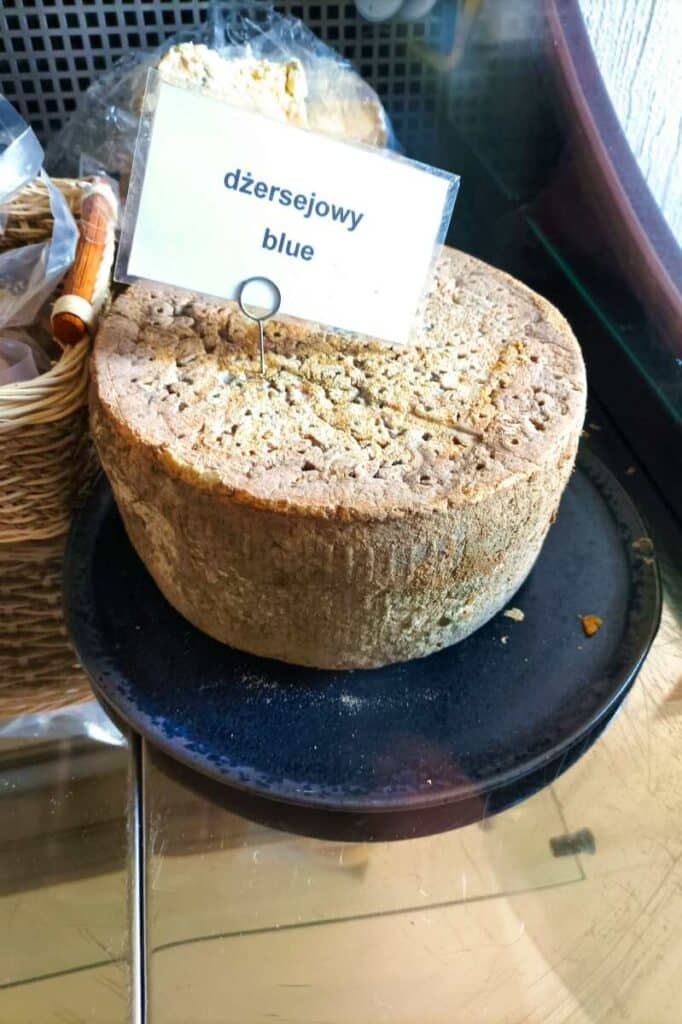
In the meantime, the small business, where the cheese is also matured, has won countless awards and hotels, private buyers from overseas and Michelin-starred restaurants are queuing up to buy the coveted wheels or even just a few slices. Incidentally, the cheese is available in various degrees of ripeness, although it is always mild, which is due to its high butterfat content.
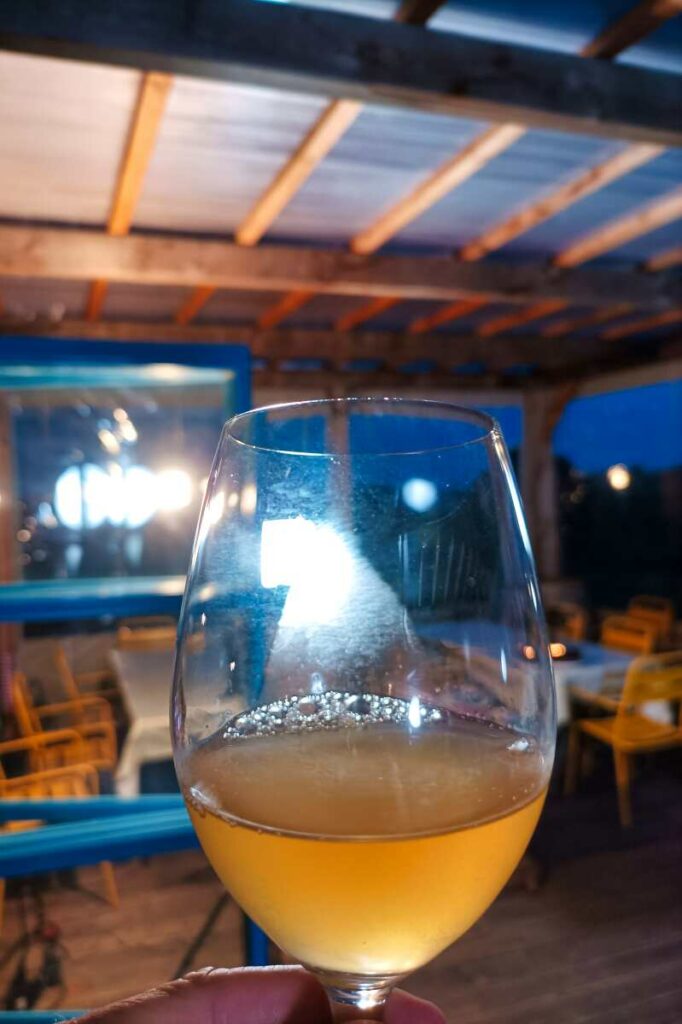
Kwaśne Jabłko
I wonder if cider goes well with cheese? We wish we had taken some cheese with us to try when we made our way to the no man’s land between the Herderstadt Mohrungen (Morąg) and Guttstadt (Dobre Miasto). The 50-hectare farm Kwaśne Jabłko, which can be translated as “sour apple”, is located directly in the idyllic valley of the Passarge River (Pasłęka). The countless apple trees here are many years old and the operators feel a close connection to the region and its eventful history. They repeatedly express their respect for the German farmers who planted the trees here before the Second World War, when the area was still known as “Oberland”.
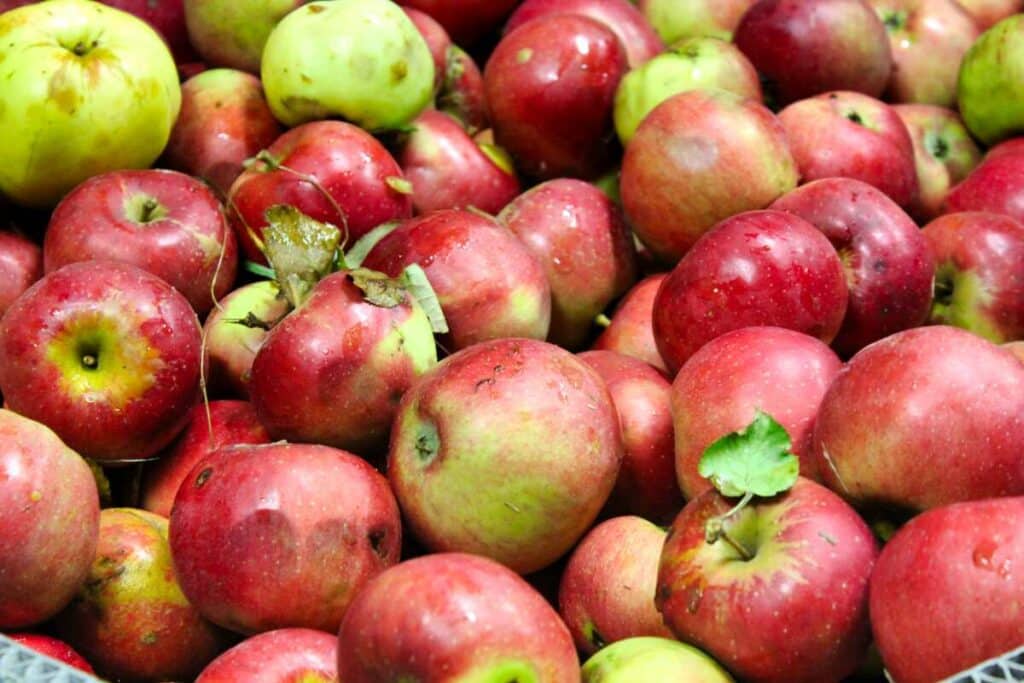
And this love for the region is evident in the delicious cider that is produced here. Different types of apples are used, with some juices even maturing to cider in barrique barrels by spontaneous fermentation, which gives the whole thing a very special touch. Incidentally, no yeast is used in the process. The leftovers from the completely organic production are then processed into pig feed – sustainability is a top priority here. Incidentally, the cider produced in Poland is slightly more sour than the cider you may know from France. Experts recommend enjoying it with fish dishes in particular, as it adds a whole new note to their flavor.
In any case, we really liked it here and found both the sweeter and the slightly more sour varieties delicious! By the way, if you are interested in the various drinks of Eastern and Central Eastern Europe, then take a look here.
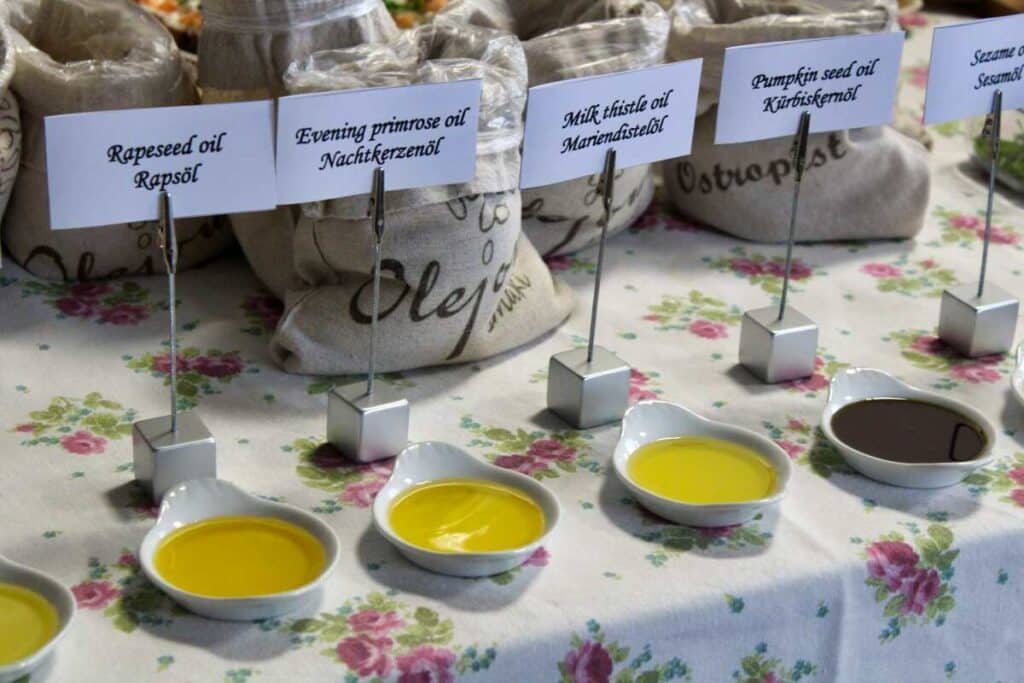
Olejowe Smaki
We felt very much at home in Masuria. Our next stop, however, was the area around Białystok in the far north-east of Poland. Here lies the small village of Turośń Kościelna, which is difficult to pronounce, but is home to a special place called Olejowe Smaki. All kinds of oils are produced here and you can learn a lot about the products pressed from various seeds. The operators of the small oil mill are convinced that there is an oil for almost every illness that can alleviate the symptoms. This may even apply to the famous Gault&Millau, which in any case explicitly recommends the oils. A nice side effect: the pressed seeds are processed into pellets – a real zero-waste operation.
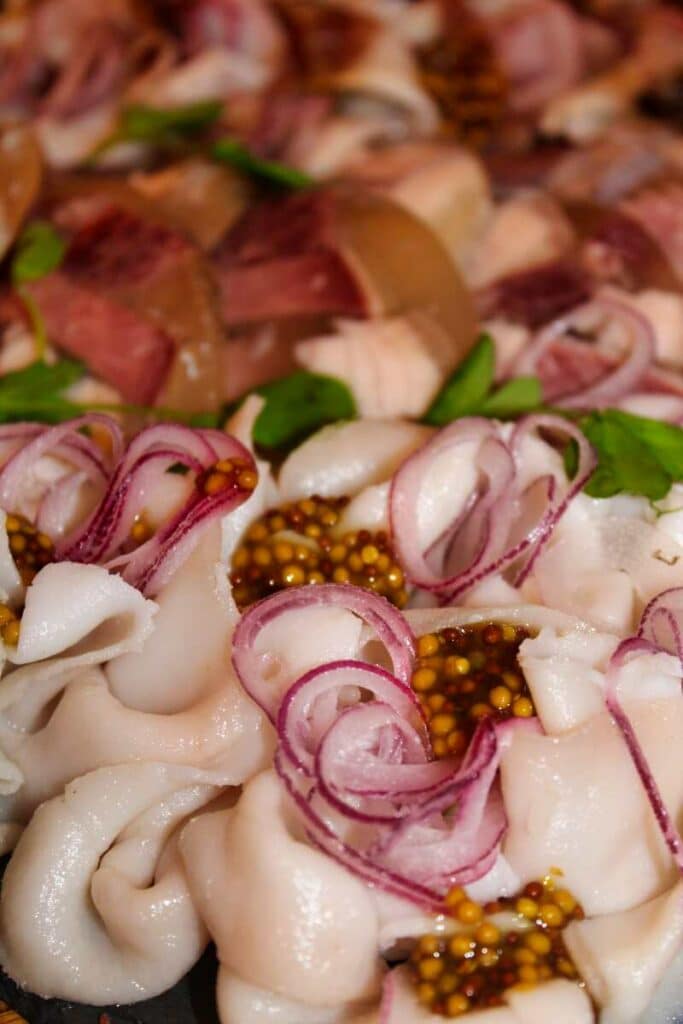
Ancypo
Let’s move on to classic Polish products – sausage and meat. Here at home, too, many people go to Polish stores and buy sausages from Poland because they are simply of excellent quality. So the bar is set high. And as you can see from the cover photo, we were not disappointed at Ancypo in Sokółka near Białystok. In the traditional way, meat is purchased here exclusively from local farmers, which is then processed in many different ways, which has already won the company countless awards.
Whether sausage, bacon, salami or ham – everything is of outstanding quality and we can only warmly recommend it to you. You can also get it in Krynki and Białystok or order it directly to your home via Ancypo.
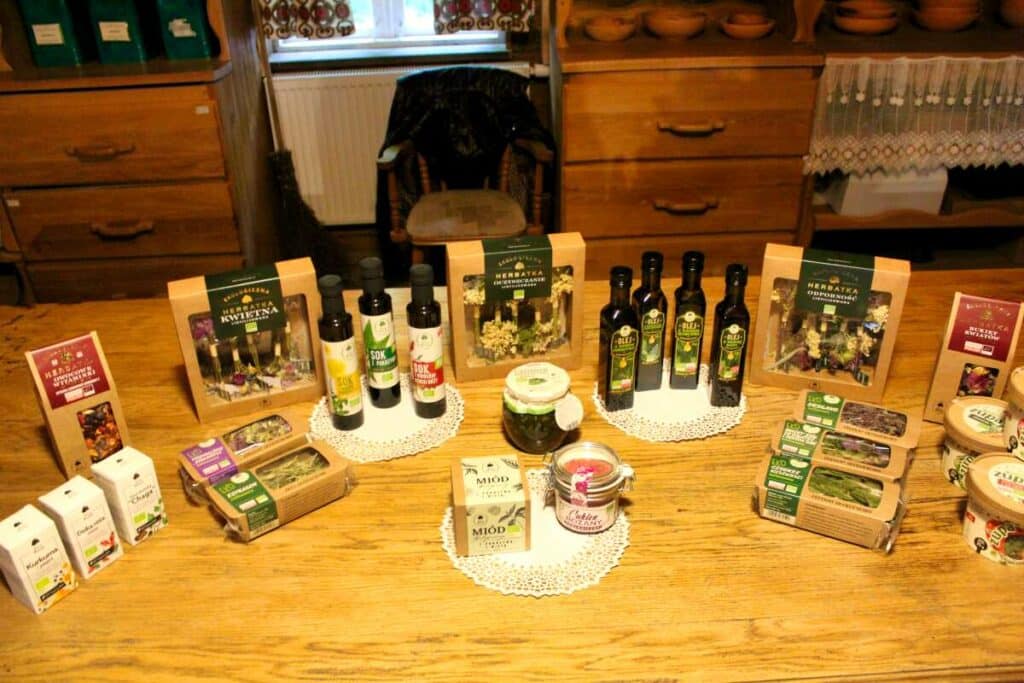
Ziołowy Zakątek
About halfway between Białystok and Siedlce is our next stop, the Ziołowy Zakątek, loosely translated as “herbal corner”. This region of Poland is considered to be particularly traditional and a melting pot of cultures. In the border triangle between Poland, Ukraine and Belarus, it was not only the Catholic and Orthodox churches that fought for the upper hand for a long time, but traditional shamanic ways of life also survived for a long time. And these shamans passed on their knowledge of the healing power of herbs for generations. Ziołowy Zakątek picks up on these traditions and sells herbs, herbal mixtures and much, much more.
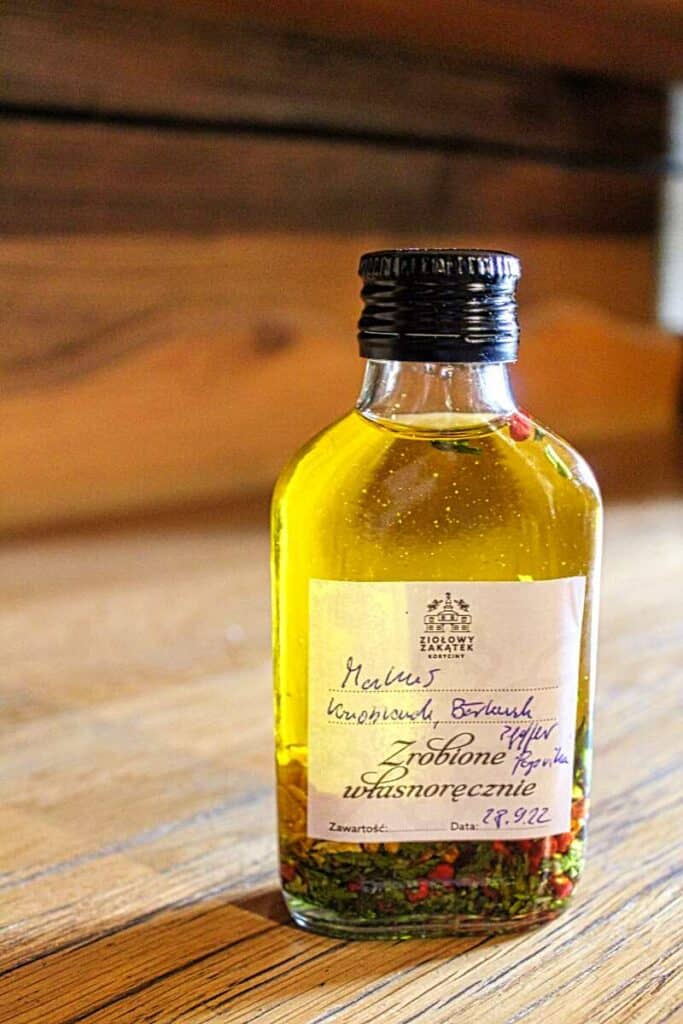
You can even make your own oil in workshops and customize it to your liking. But there is much more to discover!
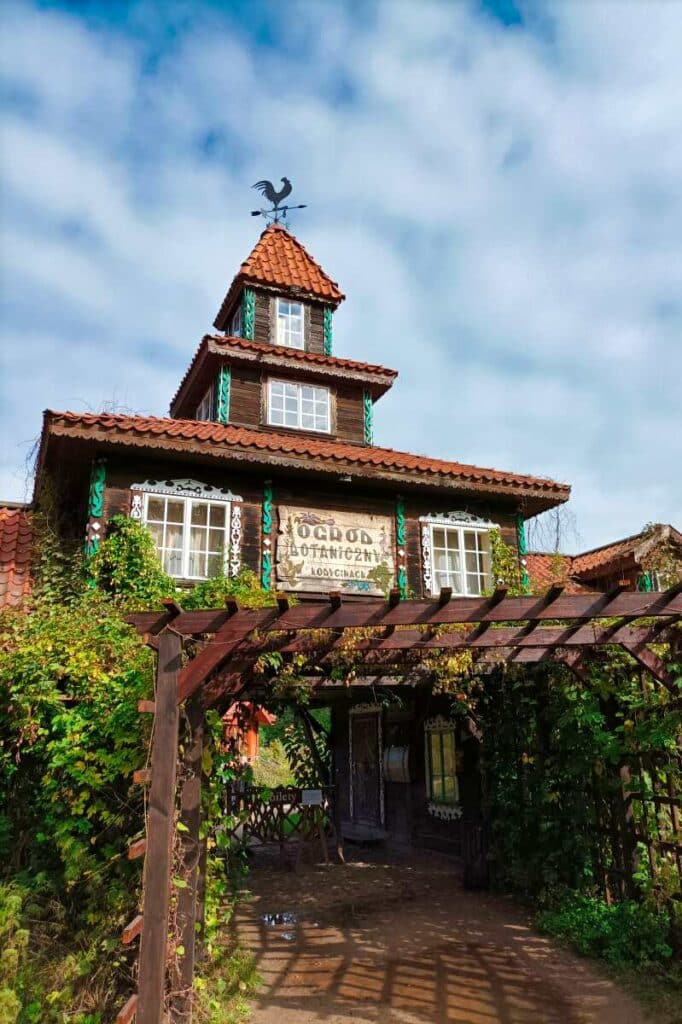

Ziołowy Zakątek is not just a herb store, it is also home to a huge botanical garden, a spa, a hotel, a restaurant and much more. So if you want to enjoy a vacation in harmony with nature, then this is the place for you!
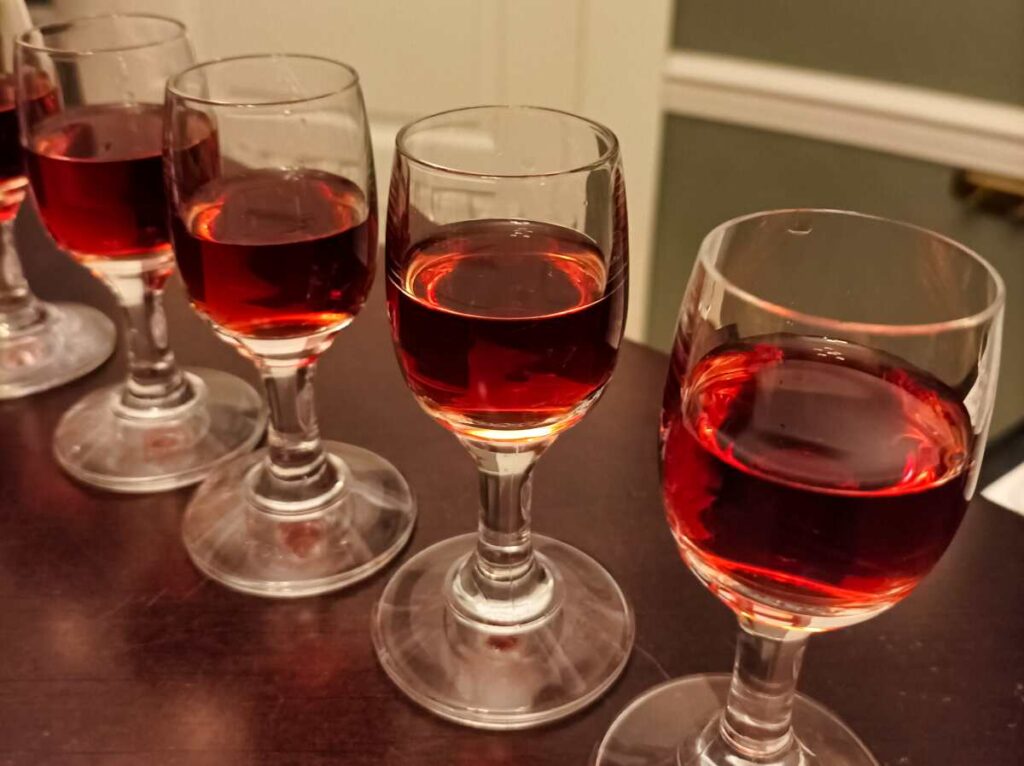
Manufaktura Cieleśnica
Our next spot is not only interesting from a culinary point of view. Cieleśnica is just a stone’s throw from the border with Belarus at the gates of Janów Podlaski, which is famous for its horse breeding. There is a dreamlike estate here that looks like an enchanted castle, especially when the mists from the River Bug float over the estate in the morning.
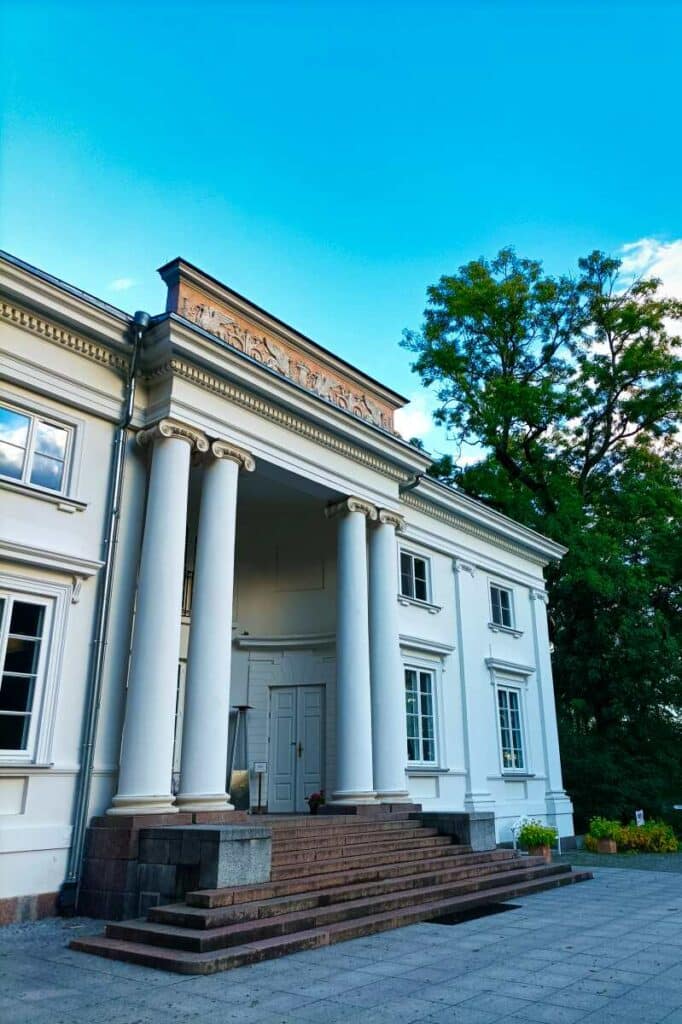
The castle once belonged to the famous Radziwiłł family of magnates, and after extensive restoration work, a hotel was established here. And a distillery! The friendly distiller Szymon distils delicious schnapps and liqueurs in a variety of flavors and strengths in an outbuilding belonging to the estate. And they are really good! Here, too, the ancient knowledge of the local population has been used, who have been producing delicious drinks from the fruit varieties found here for centuries.
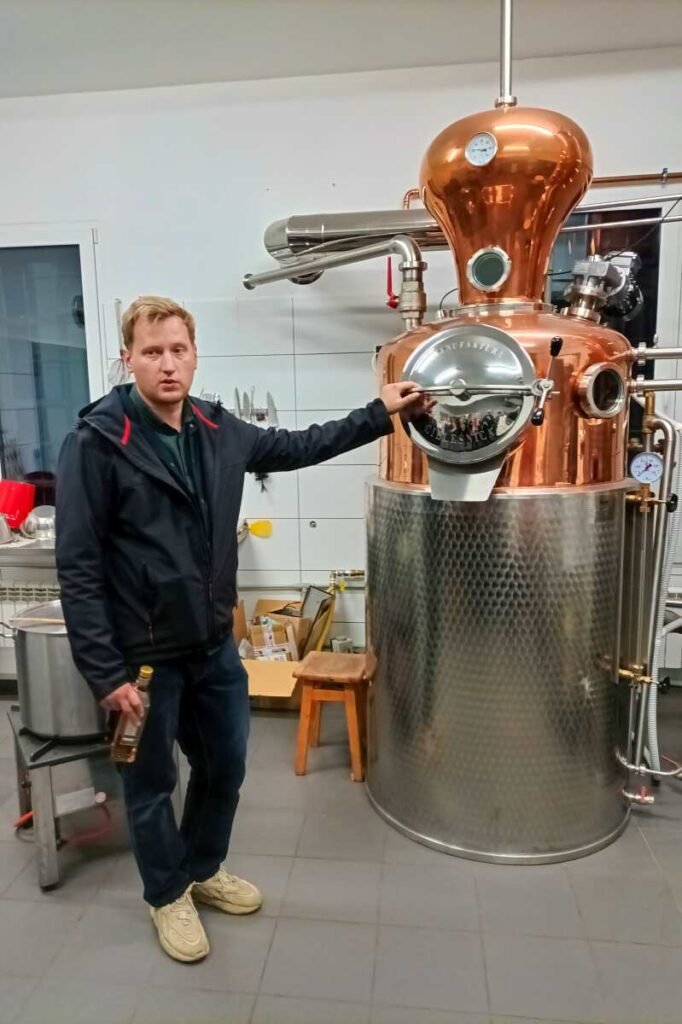
What we particularly liked, apart from the castle, was the lost place behind it. A vodka factory was built here in the 1920s, which gradually fell into disrepair. It’s a bit spooky to walk around here before you get to the modern distillery. Even though Cieleśnica is quite far to the east and not easy to reach, we highly recommend a visit due to the unique atmosphere of the place.
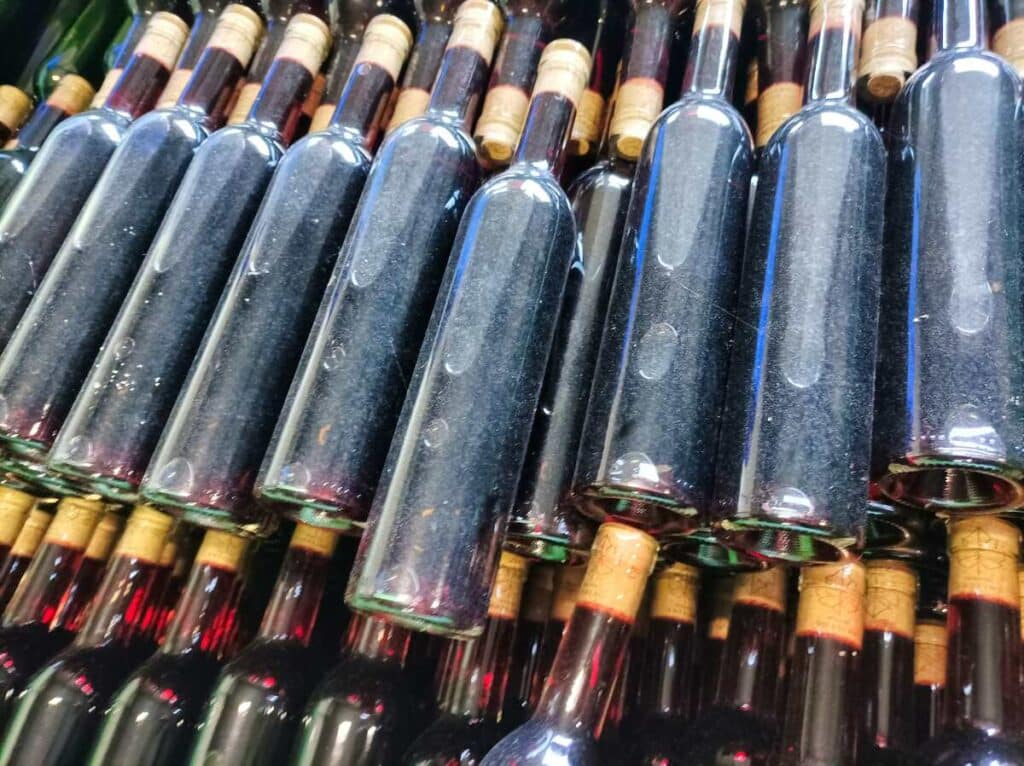
Winnica Dwórzno
Ok, now it’s getting a bit bizarre. At the end of the trip, we went to Warsaw. So far, so normal. But we really didn’t expect what awaited us just outside the city gates. There is a winery here! Poland is hardly ever associated with wine, but rather with vodka or beer. However, there are actually several wine-growing areas, especially in the west of the country, and the region around Zielona Góra (Grünberg) is particularly famous for its wine. There are a total of 400 wineries in the country, although they only have a total cultivation area of around 600 hectares. But we really wouldn’t have expected to find a winery this far east, where the climate is clearly continental.
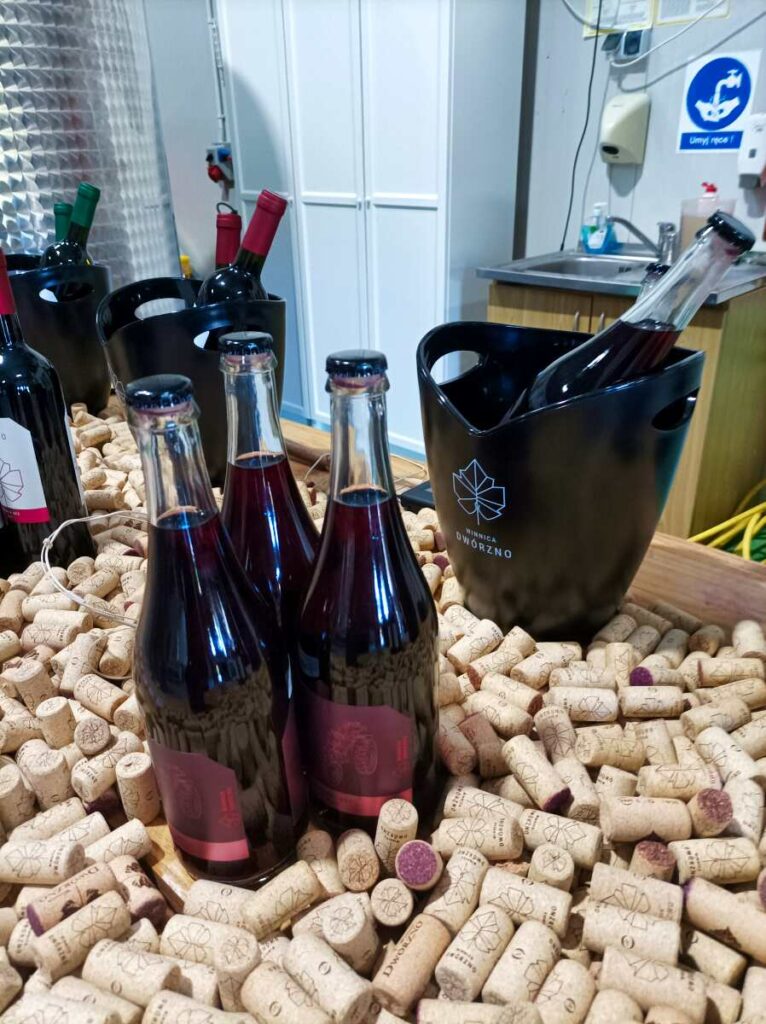
The family-run Winnica Dwórzno defies the sometimes harsh winter temperatures and has now become the largest winery in the whole of central Poland. The exciting thing is that the Polish wine market is barely regulated. What may not sound so good at first glance, in practice means that winegrowers have a high degree of creative freedom and can let off steam as they please. Incidentally, the main grape varieties grown in Poland are Solaris (by far the most popular), Hibernal, Seyval Blanc and Regent. These are all varieties that cope well with frost.
The vines were imported from Germany. But why was a winery established here in the heart of Mazovia of all places? This is because the family used to run a raspberry farm here and at some point came up with the idea of making wine from raspberries, which quickly became very popular. And at some point, people began to make wine from grapes, just as we are used to doing here.
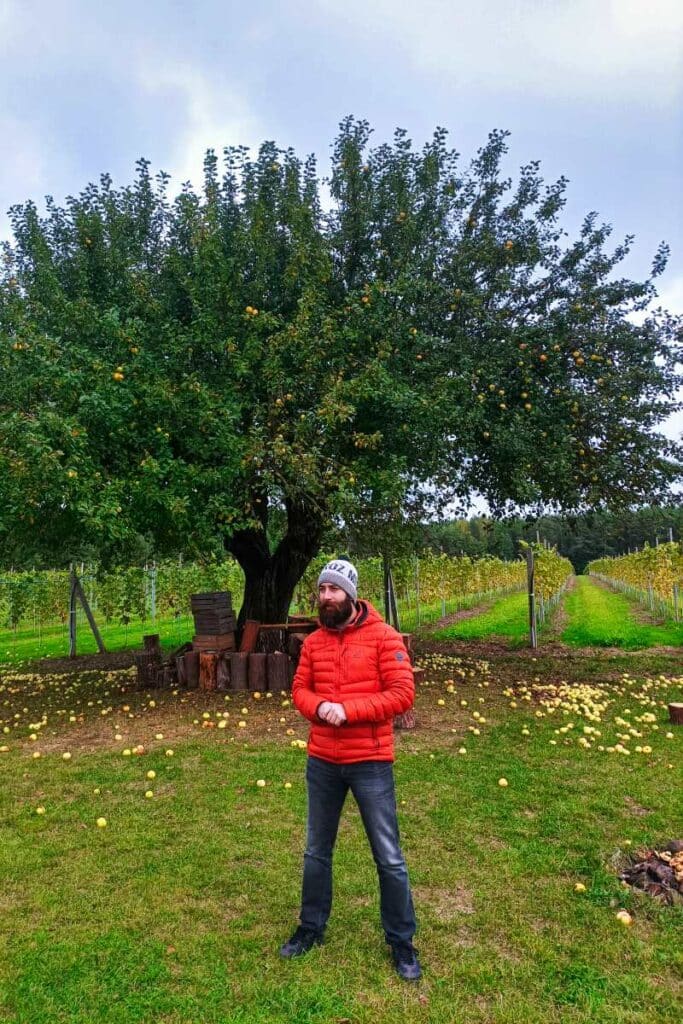
The climatic conditions you are confronted with here are not easy. The ground frost in particular is a problem for the vines, but hoses that can be filled with hot water were quickly laid to deal with the problem. And so it was possible to produce at least 50,000 bottles per year, with the harvest taking place very late in the year, typically at the end of September or the beginning of October. Not only can you do a tasting on the farm, but you can also take a tour through the vines, even an audio tour with your smartphone is possible.
Poland tastes good – That was our tour
We already knew that Poland tastes good. Nevertheless, we learned a lot of new, exciting and above all surprising things on our trip and are always fascinated by the diversity of Polish agricultural products. We particularly like the fact that sustainability now plays a very important role in Poland and that the farms here attach great importance to quality, harmony with nature and short transportation routes.
Book tips on the topic Poland tastes good
Are you hungry, want to cook Polish dishes or already know a bit about Polish cuisine? You already know that Poland tastes good, so take a look at our selection of cookbooks.
No products found.
Food blogger Sylwia Erdmanska-Kolanczyk has already written several cookbooks and dedicates this one to her culinary (and actual) homeland of Poland. She gives many dishes a modern twist and reinterprets old recipes.
No products found.
In his book “Babka”, the author lists 60 classics of Polish cuisine. The well-described dishes are complemented by beautiful pictures that whet the appetite as soon as you leaf through the book.
No products found.
A cookbook with a difference: the author not only lists common and unusual Polish recipes, but also describes their origins and offers delicious cocktail recipes! However, the book is only available in English.
No products found.
You want to explore Masuria? No problem with my new travel guide. It will be available from the beginning of 2023, but you can pre-order it now!
#KOWR #polandtastesgood #polishfood #poland
What makes Polish cuisine special for you and what are your favorite dishes? Let us know and write us a comment!
Take a look at what our colleague Trolleygirl has written on the subject!



